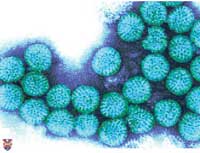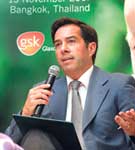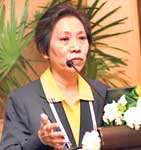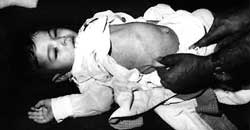
Guarding against rotavirusYou know your children are most likely suffering from gastroenteritis when you're struggling to cope with episodes of vomiting, diarrhoea, abdominal pain and fever. One of the leading causes of gastroenteritis is the rotavirus. Currently, medical practitioners treat the symptoms, and emphasise oral rehydration to prevent dehydration - the most life threatening result of such continuous diarrhoea. The launch of a new vaccine that may change this approach, was announced at a news conference held in Bangkok by pharmaceutical giant GlaxoSmithKline (GSK) recently. The vaccine, which must be administered at a young age, is said to protect infants and children from severe rotavirus gastroenteritis infections. Will prevention be better than cure, in this case?
"Rotavirus is so democratic, it can affect both rich and poor countries, even though [the latter] may have a better sanitation and a better health care system," said Prof. Dr. Usa Thisyakorn, Professor of Paediatrics, Chulalongkorn University, Bangkok and President of the Paediatric Society of Thailand. She went on to add that though many people are unfamiliar with it, rotavirus is not something new. In the first report from the Asian Rotavirus Surveillance Network (ARSN), released in 2004, the group stated, "Rotavirus remains the most common cause of severe, dehydrating diarrhoea among children worldwide”. The data compiled by ARSN from 2000 onwards collected from 36 hospitals in nine countries, revealed that probably half of the diarrhoeal cases in Asia were caused by rotavirus. Quoting more statistics, Prof. Dr. Thisyakorn said that the virus was responsible for 24 million out-patient visits, 2.4 million in-patient visits and ultimately about 6,000,000 deaths worldwide. Also, more fatal cases of rotavirus gastroenteritis have been reported among Asian children, she said comparing the death toll in Asia (231, 375) with other continents like Africa (183,675.) "We start forgetting how difficult it is when a young child or infant is sick and must be hospitalised," reflected Dr. Irving C. Boudville, Regional Director of Medical Affairs, Paediatric Vaccines at GSK Biologicals. This is especially true when one considers that the children are most likely to suffer from rotavirus gastroenteritis between 6 -24 months of age, though they are susceptible up to five years of age.
The virus which is highly contagious can linger for hours on the contaminated surfaces of objects like toys, and can also be airborne making improved general hygiene, sanitation standards and washing hands important but not a 100% effective deterrent. "Vaccination is the best strategy for prevention," said Prof. Dr. Thisyakorn, revealing that the World Health Organization, the Asian Pacific Paediatric Association and the International Paediatric Association have concurred. "We know it infects every child before their fifth birthday," said Prof. Dr. Miguel O' Ryan, Professor of Microbiology and Mycology at the University of Chile in Santiago. Prof. Dr. O' Ryan who headed some of GSK's medical trials for the vaccine, went on to add, "some of them will have a very mild disease, fortunately, and some will be infected and not have diarrhoea at all, but around 1 in 5 children will need to see a doctor before their fifth birthday. One in 70 will need to be hospitalised because the diarrhoea is so severe that it cannot be managed by oral rehydration and will require I.V fluids....even in 2007, one in 300 children will die due to intense diarrhoea caused by rotavirus”. Many such deaths are among children who do not receive rehydration fluid or who do not make it to the hospital in time, he said. However, even when this circumstance is avoided, the emotional strain and economic drain of hospitalisation can adversely impact families. Announcing, "We now have a vaccine to prevent the disease," Prof. Dr. O' Ryan explained that the vaccine is what is known as an attenuated virus. "This means that it is not a virus that causes a disease in the child, but it is a virus that produces an immune response that will protect that child when he or she is exposed to the real rotavirus," he said, adding that it can be co-administered with all the vaccines currently included in immunization programmes. The two doses which are given orally have been proven to significantly reduce severe rotavirus gastroenteritis disease - at least 85% in Latin America and 96% in Europe, he said explaining that this was the type that resulted in children needing admission to hospitals.
Revealing the results of extensive clinical trials conducted by GSK to test the safety and efficacy of the new vaccine, Prof. Dr. O' Ryan said, "It has been shown to reduce any rotavirus gastroenteritis by 87% in Europe and it has an 85% to 100% reduction in hospitalisations associated with rotavirus gastroenteritis in small children and infants. It protects against circulating wild types G1, G3, G4, G9 and G2 - which are the relevant serotypes circling all around the world," in essence establishing that "the vaccine probably affords 70% to 80% protection against all rotavirus infections - mild moderate or severe”. In addition, "rotavirus is not the only cause of gastroenteritis leading to hospitalisation but it is the most important cause, and this sole vaccine reduces gastroenteritis related hospitalisations due to any cause from 40 % to 75%," he concluded. First launched in Mexico, the vaccine has been licensed in 100 countries, including the European Union. In Asia, it is for sale in Singapore, the Philippines, Thailand, Malaysia, Vietnam, Hong Kong and Taiwan. The vaccine is also a part of the official national vaccination programmes in Brazil, El Salvador, Panama, Venezuela, Mexico, Australia, Belgium, Luxemburg and Austria.
|
|| Front
Page | News | Editorial | Columns | Sports | Plus | Financial
Times | International | Mirror | TV
Times | Funday
Times | Medi Scene || |
| |
Reproduction of articles permitted when used without any alterations to contents and the source. |
© Copyright
2007 | Wijeya
Newspapers Ltd.Colombo. Sri Lanka. All Rights Reserved. |



